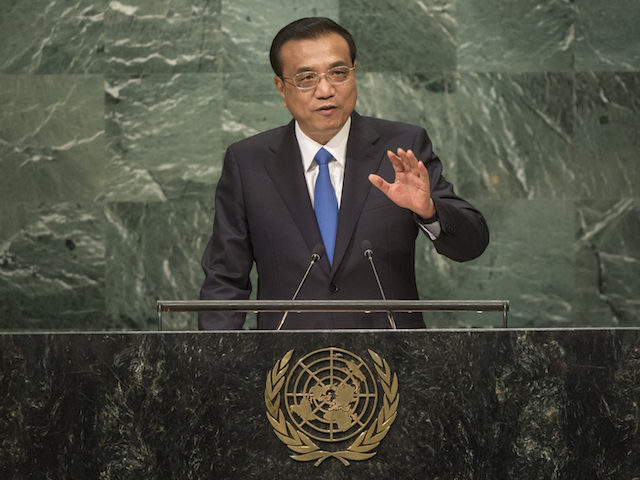Speaking to the United Nations General Assembly, Chinese Premier Li Keqiang was notably silent on the ongoing dispute in the South China Sea, instead demanding “developed countries” conform to climate change protocols and asserting “terrorism should not be linked with certain countries, races, or religions.”
In a particularly nebulous address that only mentioned two specific conflict areas – Syria and North Korea – Li focused most of his remarks on “sustainable development” and economic recovery. “Only development can guarantee peoples fundamental rights… [and] can advance human civilization and progress,” he said. Li remarked that China had become the world’s second-largest economy in 2010 and that developed nations must abide by strict climate change protocols, but noted China should not be included in that list.
“China remains a developing country and there is still a long way to go before China reaches modernization,” he alleged.
Li urged “a political solution” to the Syrian civil war while not specifying what that would entail, and affirmed that “terrorism is the common enemy of mankind” but “double standards should not be applied and terrorism should not be linked with certain countries, races, or religions.”
China has implemented strict limitations on the practice of Islam in the western province of Xinjiang, home to the nation’s large Uighur Muslim minority. Uighurs cannot wear Islamic garb on public transportation or openly observe the Ramadan fast if they are members of the Communist Party, and Muslims businesses are forced to sell haram products such as alcohol and cigarettes. China cites “terrorism” as the reason for these laws.
On disputes generally, Li urged world leaders to “support the leading role of the UN and Security Council,” “pursue political solutions to hotspot issues,” and “renounce a zero-sum mentality.”
China vows to “make continuous contributions to regional peace and stability,” particularly on “disputes concerning territory,” Li asserted.
China is the main belligerent party in the ongoing territorial dispute in the South China Sea. Beijing claims territory belonging to Brunei, Taiwan, the Philippines, Vietnam, and Malaysia, as well as the waters off the coast of Indonesia’s Natuna Island. The Chinese government has constructed multiple artificial islands out of reefs in the Spratly and Paracel island chains and equipped the islands with advanced surveillance mechanisms, surface-to-air missiles, and fighter jets. China has rejected the verdict of an international tribunal at the Hague concluding its claims were illegitimate, with Chinese media declaring that “eunuch” Japanese and American diplomats manipulated the court system to hurt China, despite neither nation having a territorial stake in the region.
In the process of constructing artificial islands for military use, China destroyed at least 17 naturally occurring reef ecosystems in the South China Sea, according to a Philippine government assessment of the Spratly Islands.

COMMENTS
Please let us know if you're having issues with commenting.